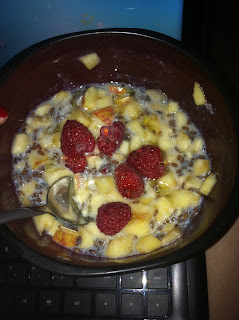Over 5000 years ago the Incas cultivated the grain-like seed quinoa as one of their staple crops.
Now science has shown that this humble "grain" is actually a superfood! Quinoa is full of phytonutrients, antioxidants AND can even help balance your blood sugar.
As a result, people everywhere are discovering the benefits of quinoa, a delicious whole "grain" that is easy to digest, full of high quality protein and fiber, and can form the basis for delicious meals.
You've probably heard that you should eat whole grains, but try the gluten free grain-like seed called "quinoa" instead of wheat. Quinoa provides more amino acids, enzymes, vitamins, minerals, fiber, antioxidants, and phytonutrients than most other grains!
"Quin-WHAT?"
Quinoa (pronounced keen-wah) is not a grain; it is actually a seed and related to the spinach family. When cooked, quinoa is light, fluffy, slightly crunchy and subtly flavored. It actually cooks and tastes like a grain, making it an excellent replacement for grains that are difficult to digest. But its flavor is only part of why quinoa is such an amazing "supergrain."
Some of the nutrients in quinoa include:
- Complete protein. Quinoa contains all 9 essential amino acids that are required by the body as building blocks for muscles.
- Magnesium. helps relax your muscles and blood vessels and effects blood pressure. Quinoa contains high levels of this vital nutrient.
- Fiber. Quinoa is a wonderful way to ensure that you consume valuable fiber that eases elimination and tones your colon.
- Manganese and copper. Quinoa is a good source of these minerals that act as antioxidants in your body to get rid of dangerous cancer and disease-causing substances.
Compared to other grains, quinoa is higher in calcium, phosphorus, magnesium, potassium, iron, copper, manganese, and zinc than wheat, barley, or corn.
Studies have shown that quinoa has documented health benefits too!
Quinoa, in its whole grain form, may be effective in preventing and treating these conditions:
- Artherosclerosis
- Breast cancer
- Diabetes
- Insulin resistance
Researchers attribute the health benefits of quinoa to its complete nutritional makeup.
Quinoa is close to one of the most complete foods in nature because it contains amino acids, enzymes, vitamins and minerals, fiber, antioxidants, and phytonutrients.
Quinoa
We recommend quinoa because it does not feed fungal and bacterial infections in your body (and doctors estimate that 8 in 10 Americans have fungal infections.
Quinoa has other qualities that make it an ideal "grain":
- Quinoa acts as a prebiotic that feeds the microflora (good bacteria) in your intestines.
- Quinoa is easily digested for optimal absorption of nutrients.
- Quinoa is gluten-free and safe for those with gluten intolerance, people on a celiac diet, and for autistic children who follow the Body Ecology program for autism.
Quinoa in the Kitchen
Quinoa is especially easy to cook and can be enjoyed year-round because it's versatile and light. You can use it in warming winter soups or refreshing summer salads.
Make sure you rinse your quinoa and then soak for at least 8 hours to remove the phytic acid that can prevent proper digestion. Cooking quinoa takes 15 minutes or less, and it's ready to mix with a variety of ingredients to create diverse and delicious meals.
Here are some ideas for your next quinoa meal:
- Sautee garlic, onions, and spinach with coconut oil to top your quinoa.
- Make a summery salad by chopping raw carrots, zucchini, cultured vegetables, and onions over quinoa.
- Use quinoa with vegetable broth and your choice of vegetables for a nutritious soup.
- Make a rich gravy for your quinoa for a satisfying alternative.
Quinoa, a delicious gluten free grain-like seed, is full of nutrients and acts as a prebiotic to feed the healthy microflora in your intestines.
It makes a great breakfast meal and can be enjoyed in its wholegrain form or try quinoa flakes hot cereal as a wonderful replacement for oatmeal! We also recommend eating quinoa in the evening. It is the ideal easy-to-digest food to eat in the evening because it encourages a good night's sleep. To aid your digestion even more, be sure to add fermented foods and drinks, like cultured vegetables and probiotic liquids. Quinoa can be your superfood: regulating your blood sugar, enhancing elimination, and keeping your heart healthy. Add this "mother grain" to your diet and enjoy the health benefits of quinoa, just like the Incas did thousands of years ago!






















































